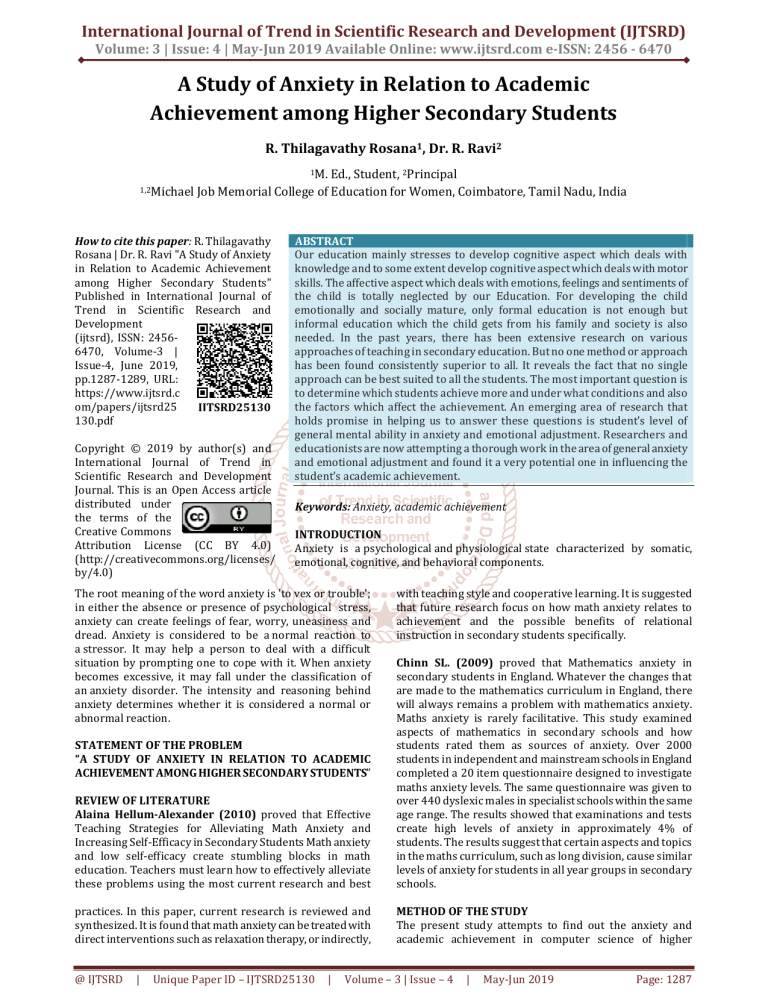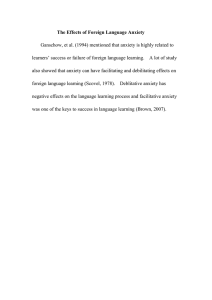
International Journal of Trend in Scientific Research and Development (IJTSRD)
Volume: 3 | Issue: 4 | May-Jun 2019 Available Online: www.ijtsrd.com e-ISSN: 2456 - 6470
A Study of Anxiety in Relation to Academic
Achievement among Higher Secondary Students
R. Thilagavathy Rosana1, Dr. R. Ravi2
1M.
Ed., Student, 2Principal
1,2Michael Job Memorial College of Education for Women, Coimbatore, Tamil Nadu, India
How to cite this paper: R. Thilagavathy
Rosana | Dr. R. Ravi "A Study of Anxiety
in Relation to Academic Achievement
among Higher Secondary Students"
Published in International Journal of
Trend in Scientific Research and
Development
(ijtsrd), ISSN: 24566470, Volume-3 |
Issue-4, June 2019,
pp.1287-1289, URL:
https://www.ijtsrd.c
om/papers/ijtsrd25
IJTSRD25130
130.pdf
Copyright © 2019 by author(s) and
International Journal of Trend in
Scientific Research and Development
Journal. This is an Open Access article
distributed under
the terms of the
Creative Commons
Attribution License (CC BY 4.0)
(http://creativecommons.org/licenses/
by/4.0)
ABSTRACT
Our education mainly stresses to develop cognitive aspect which deals with
knowledge and to some extent develop cognitive aspect which deals with motor
skills. The affective aspect which deals with emotions, feelings and sentiments of
the child is totally neglected by our Education. For developing the child
emotionally and socially mature, only formal education is not enough but
informal education which the child gets from his family and society is also
needed. In the past years, there has been extensive research on various
approaches of teaching in secondary education. But no one method or approach
has been found consistently superior to all. It reveals the fact that no single
approach can be best suited to all the students. The most important question is
to determine which students achieve more and under what conditions and also
the factors which affect the achievement. An emerging area of research that
holds promise in helping us to answer these questions is student’s level of
general mental ability in anxiety and emotional adjustment. Researchers and
educationists are now attempting a thorough work in the area of general anxiety
and emotional adjustment and found it a very potential one in influencing the
student’s academic achievement.
Keywords: Anxiety, academic achievement
INTRODUCTION
Anxiety is a psychological and physiological state characterized by somatic,
emotional, cognitive, and behavioral components.
The root meaning of the word anxiety is 'to vex or trouble';
in either the absence or presence of psychological stress,
anxiety can create feelings of fear, worry, uneasiness and
dread. Anxiety is considered to be a normal reaction to
a stressor. It may help a person to deal with a difficult
situation by prompting one to cope with it. When anxiety
becomes excessive, it may fall under the classification of
an anxiety disorder. The intensity and reasoning behind
anxiety determines whether it is considered a normal or
abnormal reaction.
with teaching style and cooperative learning. It is suggested
that future research focus on how math anxiety relates to
achievement and the possible benefits of relational
instruction in secondary students specifically.
REVIEW OF LITERATURE
Alaina Hellum-Alexander (2010) proved that Effective
Teaching Strategies for Alleviating Math Anxiety and
Increasing Self-Efficacy in Secondary Students Math anxiety
and low self-efficacy create stumbling blocks in math
education. Teachers must learn how to effectively alleviate
these problems using the most current research and best
Chinn SL. (2009) proved that Mathematics anxiety in
secondary students in England. Whatever the changes that
are made to the mathematics curriculum in England, there
will always remains a problem with mathematics anxiety.
Maths anxiety is rarely facilitative. This study examined
aspects of mathematics in secondary schools and how
students rated them as sources of anxiety. Over 2000
students in independent and mainstream schools in England
completed a 20 item questionnaire designed to investigate
maths anxiety levels. The same questionnaire was given to
over 440 dyslexic males in specialist schools within the same
age range. The results showed that examinations and tests
create high levels of anxiety in approximately 4% of
students. The results suggest that certain aspects and topics
in the maths curriculum, such as long division, cause similar
levels of anxiety for students in all year groups in secondary
schools.
practices. In this paper, current research is reviewed and
synthesized. It is found that math anxiety can be treated with
direct interventions such as relaxation therapy, or indirectly,
METHOD OF THE STUDY
The present study attempts to find out the anxiety and
academic achievement in computer science of higher
STATEMENT OF THE PROBLEM
“A STUDY OF ANXIETY IN RELATION TO ACADEMIC
ACHIEVEMENT AMONG HIGHER SECONDARY STUDENTS”
@ IJTSRD
|
Unique Paper ID – IJTSRD25130
|
Volume – 3 | Issue – 4
|
May-Jun 2019
Page: 1287
International Journal of Trend in Scientific Research and Development (IJTSRD) @ www.ijtsrd.com eISSN: 2456-6470
secondary students. Since the problem is concerned with
"Survey" type, the investigator has selected the normative
survey method for conducting the study.
The word 'survey' indicates the gathering of the data
regarding current conditions. The word "normative" is used
because surveys are frequently made for the purpose of
ascertaining which is the normal or typical condition or
practice. "Normative Survey" is applied in order to suggest
the two closely related aspects of study. The descriptive or
normative survey method of educational research is very
common. It is that method of investigation which attempts
to describe and interpret what exists at present in the form
of conditions, practices, processes, attitudes, beliefs etc. It is
concerned with the phenomena that are typical of the
normal conditions. It is an organized attempt to analyze,
interpret, report the present status of social institution,
group or area.
SAMPLE AND SAMPLING TECHNIQUES
Nine schools are selected through stratified random
sampling technique. The sample for the present study
consisted of 300 higher secondary students in Coimbatore
district. The students of both sexes coming from both rural
and urban areas were included in the study.
TOOL USED IN THE STUDY
The data are essential for carrying out research
investigation. The data are collected with the help of the
special apparatus called as tools. The success of a research
must be received by selecting a proper tool for the research.
So, that the investigator used the following tool i.e. academic
anxiety and academic achievement in computer science.
DATA COLLECTION
In Coimbatore district, the investigator selected three
government schools, three government aided schools and
three self-financed schools using stratified random sampling
technique. A set of management students from each school
was selected in a random manner. Thus the researcher used
stratified random sampling technique for collection of data
from the vast area of Coimbatore district.
THE STATISTICAL TECHNIQUES USED
Suitable descriptive and inferential statistical techniques
were used in the interpretation of the data to draw to a more
meaningful picture of results from the collected data in the
present study from the following statistical measures were
used.
Mean
Standard deviation
‘T’ test
‘F’ test
FINDINGS OF THE STUDY
ANXIETY
It is found that, there is no significant difference in the
anxiety of higher secondary students in respect of
their gender.
It is found that, there is no significant difference in the
anxiety of higher secondary students in respect of
their locality of residence.
It is found that, there is no significant difference in the
anxiety of higher secondary students in respect of
their medium of instruction.
@ IJTSRD
|
Unique Paper ID – IJTSRD25130
|
It is found that, there is no significant difference in the
anxiety of higher secondary students in respect of
their father’s educational qualification.
It is found that, there is no significant difference in the
anxiety of higher secondary students in respect of
their mother’s educational qualification.
It is found that, there is no significant difference in the
anxiety of higher secondary students in respect of
their father’s annual income.
It is found that, there is no significant difference in the
anxiety of higher secondary students in respect of
their mother’s annual income.
It is found that, there is a significant difference in the
anxiety of higher secondary students in respect of
their type of management.
ACADEMIC ACHIEVEMENT IN COMPUTER SCIENCE
It is found that, there is no significant difference in the
academic achievement in computer science of higher
secondary students in respect of their gender.
It is found that, there is no significant difference in the
academic achievement in computer science of higher
secondary students in respect of their locality of
residence.
It is found that, there is no significant difference in the
academic achievement in computer science of higher
secondary students in respect of their medium of
instruction.
It is found that, there is no significant difference in the
academic achievement in computer science of higher
secondary students in respect of their father’s
educational qualification.
It is found that, there is no significant difference in the
academic achievement in computer science of higher
secondary students in respect of their mother’s
educational qualification.
It is found that, there is no significant difference in the
academic achievement in computer science of higher
secondary students in respect of their father’s annual
income.
It is found that, there is no significant difference in the
academic achievement in computer science of higher
secondary students in respect of their mother’s annual
income.
It is found that, there is a significant difference in the
academic achievement in computer science of higher
secondary students in respect of their type of
management.
It is found that, there is a no relationship between
anxiety and academic achievement in computer science
of higher secondary students.
CONCLUSION
Overall the present study of concluded that, there is a
significant relationship between anxiety and academic
achievement in computer science of higher secondary
students. Also it is necessary to conduct periodic teachers
and students meeting in schools to improve the anxiety and
academic achievement in Computer Science.
REFERENCE
[1] Adak, Samaresh (2017) Effectiveness of Constructivist
Approach on Academic Achievement in Science at
Secondary Level. Educational Research and Reviews,
v12 n22 p1074-1079 Nov 2017
Volume – 3 | Issue – 4
|
May-Jun 2019
Page: 1288
International Journal of Trend in Scientific Research and Development (IJTSRD) @ www.ijtsrd.com eISSN: 2456-6470
[2] Adepoju(2002) : A Study of Secondary School Students’
Academic Performance at the Senior School Certificate
Examinations and Implications for Educational
Planning and Policy in Nigeria. African Research
Review vol-5 no-6(2011) ISSN: 1994-9057
[3] Alam, Md. M. (2001), “Effect of Leadership Behaviour
on Teachers’ Job Satisfaction and Pupils’ Academic
Achievement”, Indian Psychological Review, Vol. 72,
No.
[4] Allen, Amelia Ann (2011). Perceptions of College
Students on Successful Strategies for Reducing
Mathematics Anxiety Pro Quest LLC, Ed.D. Dissertation,
Walden University
@ IJTSRD
|
Unique Paper ID – IJTSRD25130
|
[5] Andrews, Amanda; Brown, Jennifer (2015). The Effects
of Math Anxiety Education, v135 n3 p362-370.
[6] Anice James and Marice, P. 2004: Academic Stress and
Achievement in Science as related to Scientific Aptitude
and Scientific Attitude among XI standard students in
Tamil Nadu, Journal of Educational Research and
Extension, Vol.41(2), April – June 2004, pp.13-16. 209
[7] Arif Altun (2006): Undergraduate Students' Academic
Achievement, Field Dependent/ Independent Cognitive
Styles and Attitude toward Computers, Educational
Technology & Society, volume-09 No -1 p289-297
[8] Arun and Chavan (2009) Academic stress,
psychological health, and presence of suicidal ideas in
students
Volume – 3 | Issue – 4
|
May-Jun 2019
Page: 1289

